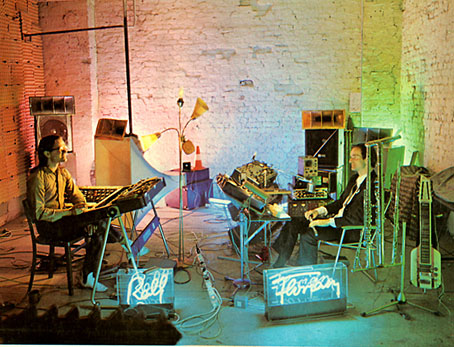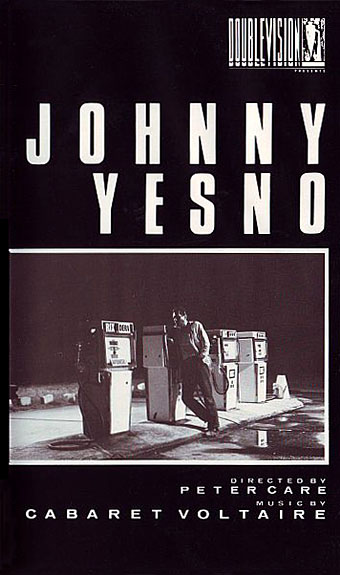
Ralf and Florian, 1973.
It’s a common problem when you like a musical artist so much that you own their entire catalogue: where to go next? In the case of Kraftwerk the problem has been exacerbated by the group’s famously sluggish rate of production: the last studio album was in 2003, the one before that was 1991. Cover versions are one solution, of course, and Kraftwerk have the advantage of providing simple yet memorable melodies that can stand no end of sonic mangling. I linked to a favourite Kraftwerk cover at the weekend, the Balanescu Quartet’s version of The Model. What follows is a list of favourite Kraftwerk cover albums (as opposed to one-off tracks). Given the vagaries of the music business some of these may now be deleted.
Possessed (1992) by The Balanescu Quartet
Robots
Model
Autobahn
Computer Love
Pocket Calculator
Kraftwerk are among the gods in the firmament of Mute Records so it’s not so surprising to find an erstwhile electronic label releasing an album of arrangements by Alexander Balanescu‘s string quartet. The Kronos Quartet were in the vanguard of working quartet variations on rock or pop music (their self-titled album from 1986 included a version of Purple Haze) but Balanescu’s arrangements still stand out for attempting to render electronic music with string instruments. Model is particularly good.
Trans Slovenia Express (1994) by Various Artists
Zrcalo Sveta (Das Spiegelglas Der Welt) by Laibach
The Robots by Coptic Rain
Trans Europe Express by The One You Love
Radioactivity by April Nine
Airwaves by Beitthron
Transistor by Data Processed Corrupted
Ohm Sweet Ohm by Borghesia
Neonlicht by Mitja V.S.
Antenna by Z-Entropa
Man Machine by Strelnikoff
Home Computer by Random Logic
The Model by Demolition Group
Kometenmelodie Part 1 by 300,000 V.K.
Spacelab by Videosex
Lie-Werk by Kraftbach
Also on the Mute label and less of a surprise since the contents are mostly from electronic groups. Laibach, who open and close the collection, were already Mute artists. Of the other Slovenians present, Borghesia and Coptic Rain were familiar names but the rest remain a mystery. This is nonetheless a great compilation with an equal mix of eccentric and sympathetic covers. Neonlicht features a banjo and the Enzo Fabiani Quartet, Coptic Rain give The Robots the Nine Inch Nails treatment while April Nine turn Radioactivity into a sublime mystery. Trans Slovenia Express Volume 2 appeared in 2005.
Die Roboter Rubato (1997) by Terre Thaemlitz
Die Roboter
Ätherwellen
Tour De France
Computer Welt
Techno Pop
Ruckzuck
Radioland
Mensch Machine
Schaufensterpuppen
Morgen Spaziergang
In which the musician/artist/theorist plays rubato piano variations on the well-known songs. The presence of Ruckzuck from the first Kraftwerk album is a surprise—hardly anyone does covers of tracks from the first two Kraftwerk albums. All Thaemlitz’s releases come with pages of accompanying text culled from Marxist theory, gender studies, queer politics and the like. Die Roboter Rubato is no exception:
Kraftwerk’s most vibrant celebration of this Homoeroticization is in the composition Tour de France. The sonic manifestation of the group’s well known adoration for cycling bears an undeniable resemblance to the sound of two men fucking one another – the rhythmic breaths of the top intermingling with the panting moans of the bottom.
Immediate questions come to mind: for all of the obviousness of homoerotic thematics in the world of the Mensch Machines, how do such thematics remain undiscussed by popular media? Is the dominant silence around homoerotic themes an act of social suppression or social obliviousness? (etc)
Subsequent Thaemlitz releases have given similar rubato treatment to Gary Numan and Devo.
El Baile Alemán (2000) by Señor Coconut Y Su Conjunto
Introdución
Showroom Dummies
Trans Europe Express
The Robots
Neon Lights
Autobahn
Home Computer
Tour De France
The Man-Machine
Music Non Stop
German electronic musician Uwe Schmidt uses his Señor Coconut guise to present songs by synth artists as though they’d been covered by a cheap Latin American ensemble. Swiss group Yello introduced Perez Prado-style shouts and brass stabs into the world of Fairlight samplers in the 1980s so this may be regarded as the logical conclusion. Funny arrangements, especially Autobahn where the car refuses to start and the radio is tuned to South American stations. Señor Coconut’s 2006 album Yellow Fever! reworks the Yellow Magic Orchestra to similar effect.
8-Bit Operators: The Music of Kraftwerk (2007) by Various Artists
The Robots (Die Roboter) by Bacalao
Pocket Calculator by Glomag
Computer Love by Covox
Showroom Dummies by Role Model
The Model by Nullsleep
Radioactivity by David E. Sugar
Kristallo by Oliver Wittchow
Spacelab by 8 Bit Weapon
Computer World (Computerwelt) by firestARTer
Electric Café by Neotericz
Trans-Europe Express by Receptors
Tanzmusik by Herbert Weixelbaum
It’s More Fun to Compute by Bubblyfish
Antenna by Bit Shifter
The Man-Machine (Die Mensch-Maschine) by gwEm and Counter Reset
The masters of minimal aesthetics here receive some minimal cover treatments. Advertised as being “performed on vintage 8-bit video game systems” I was disappointed when some tracks failed to adhere to this stricture and added other instruments.The voices can also be a letdown when they’re left unprocessed. Complaints aside, the fat and bouncy rhythms are a good match for tunes which in other electronic hands were being lured into techno remix tedium. And it’s also good to see Tanzmusik from the Ralf & Florian album given an airing.
As I noted at the weekend, Kraftwerk give a series of retrospective concerts at the Museum of Modern Art, NYC, in April.
Previously on { feuilleton }
• Martin Rushent, 1948–2011
• Autobahn animated
• Sleeve craft
• Who designed Vertigo #6360 620?
• Old music and old technology
• Aerodynamik by Kraftwerk

